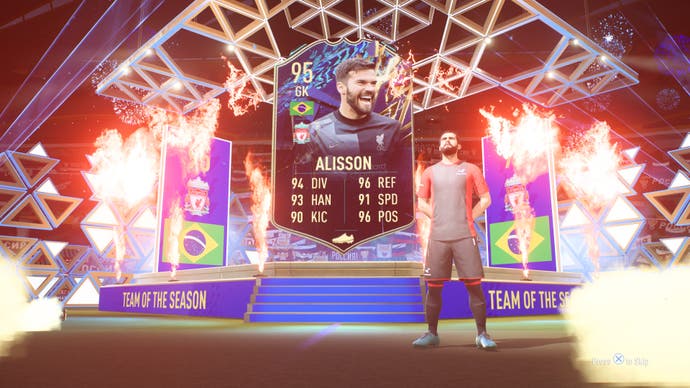EA sticks with controversial loot boxes for FIFA 23 Ultimate Team
After UK government stops short of legislation.
EA has confirmed it's sticking with loot boxes for FIFA 23's Ultimate Team mode, after the company was effectively given the green light by the UK government's recent decision not to legislate the controversial in-game monetisation system.
In a statement issued to Eurogamer, EA echoed many of its recent comments on Ultimate Team's card packs, which have come under fire from children's groups and researchers in recent years for their links to gambling, and from players for enabling pay-to-win in competitive modes.
"We wholeheartedly believe that Ultimate Team and FUT Packs, which have been part of the game for more than a decade, are a part of FIFA that players love - fans love that the game reflects the real-world excitement and strategy of building and managing a squad. Giving players the choice to spend if they want to is fair," EA's statement reads.
"It's worth saying that spending is entirely optional in our game, and we do not encourage spending over earning rewards through game play. FUT Packs work in just the same way whether they are paid for or earned, and most players don't spend in game at all. For example, nine out of 10 FUT Packs opened in FIFA 22 were earned."
Last month, the UK government stopped short of taking action on loot boxes, despite finding that players who buy loot boxes are "more likely to experience gambling, mental health, financial and problem gaming-related harms".
Instead, the government said it does not consider loot boxes to be the same as gambling, and as a result will not make changes to the Gambling Act.
Pointing to the potential high cost of regulation, the government said: "Changing the Gambling Act with regards to loot boxes would have significant implementation challenges and risks of unintended consequences."
While the government called for stronger protections from across the entire industry and insisted it "will not hesitate to consider legislation if companies do not bring in sufficient measures to keep players safe", its decision on loot boxes contrasts that of a number of European countries that have brought loot boxes under gambling laws.
FIFA is one of the most popular video game series in the world, and it's one of EA's most valuable cash cows.
Ultimate Team, which drives hundreds of millions of dollars in revenue for EA each year, revolves around the idea of building a squad of players, which you then use to play in matches, both offline and online.
There are a number of ways you can obtain players in the game, but one of the main methods is through packs of virtual cards. These card packs contain a random assortment of items, including players of varying potency you then use out on the pitch. Generally, the better the player, the lower your chance of obtaining them from a pack. Although they're not described as such in-game, Ultimate Team's card packs are loot boxes.
You can buy these card packs with either a virtual currency called FUT Coins, which is earned primarily through gameplay, or with a virtual currency called FIFA Coins, which is bought with real-world money.
It's this real-world money aspect of Ultimate Team's loot boxes - and the fact the loot boxes contain gameplay-affecting items - that has caused so much controversy for the mode and EA over the years.
In April last year, new research "robustly verified" a link between loot boxes and problem gambling. Researchers at the universities of Plymouth and Wolverhampton said loot boxes "are structurally and psychologically akin to gambling". It also found that large numbers of children are opening loot boxes.
Six parties say they would support the motion, which would bring Dutch law largely in line with Belgium - where loot boxes were outlawed back in 2018. There's recently been pressure on loot boxes in Spain, too.
And in June, a new report commissioned by the Norwegian Consumer Council concluded that loot boxes in games are "exploitative and predatory". Consumer protection agencies in 18 European countries backed the report and called for better regulation of video games.








.png?width=291&height=164&fit=crop&quality=80&format=jpg&auto=webp)

